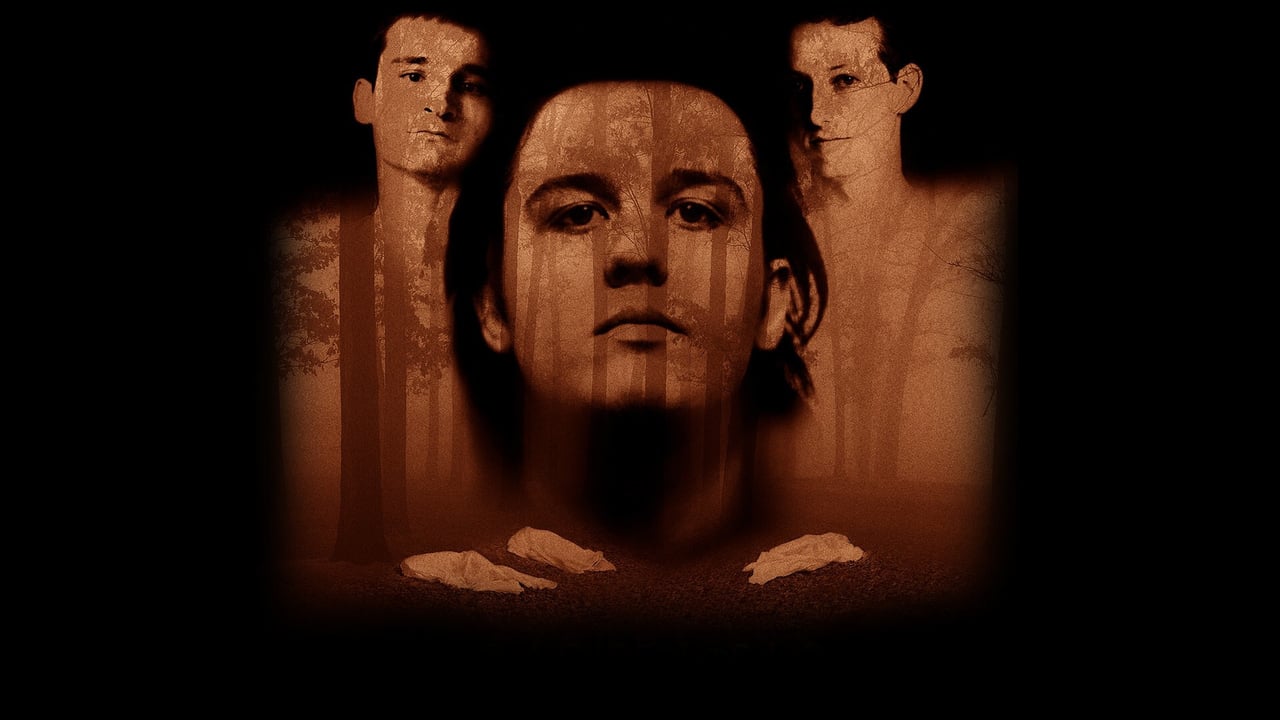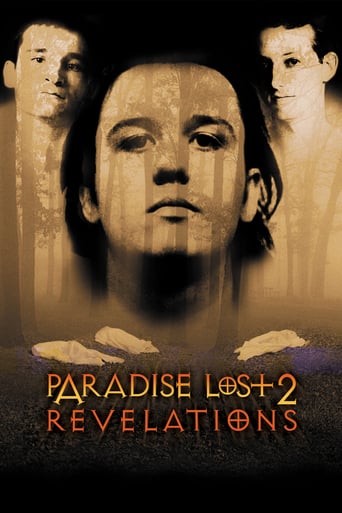



Self-important, over-dramatic, uninspired.
Really Surprised!
A film of deceptively outspoken contemporary relevance, this is cinema at its most alert, alarming and alive.
View MoreThis is a small, humorous movie in some ways, but it has a huge heart. What a nice experience.
View MoreIt's strange to come to write about Paradise Lost 2: Revelations having watch some (though not all) of the third and final entry from 2011, part 3 Purgatory (which was made the same year the West Memphis 3 - Damien Echols, Jessie Misskelley Jr., and Jason Baldwin - were finally released from prison due to an unusual 'plea' deal). I say this because by the time one watches that film, shot some 12/13 years after the second entry which was shot four years after the original Paradise Lost (93/94 in Arkansas), a key character (and I use the word Character I should say with a capital C) with John Mark Byers has changed. Hindsight is always 20/20 as the saying goes, but it is still captivating and kind of horrifying to see how Byers, and not necessarily the three (at the time) convicted killers, becomes the main character here.I have to wonder if the filmmakers went into the project knowing exactly what they would do; part of the impetus was to go back to the area in Arkansas as Echols in 1998/99 was facing a very urgent appeal process in court (with the original judge in the case, I'd say unfortunately), and also by this time the effect of the first Paradise Lost doc was such that the film itself was available as evidence for the defense. Ironically though because of the notoriety, the filmmakers Berlinger and Sinofsky weren't allowed in the courtroom, and the parents of the victims (seen in part 1) declined to be interviewed... except for Byers' stepfather, and his mother by this point had died. What did she die from? Well, that's kind of a funny story...Although the filmmakers here have access to the West Memphis 3 (Echols seems to get the most time since it's his appeals process as the focus), as well as one of the defense lawyers and a special investigator who can spot things that should have been clear to the cops at the time of the killings, and there is the group that formed to help free men and how they set up the website and (as a running thing in the movie) having an online chat for people on the site with Echols, the lack of being in the courtroom and certain subjects makes things a little more limited. It's through no fault of their own, but the filmmakers probably had to scramble to find some way to make the film more compelling. Needless to say, Mr. Mark Byers ended up, through his own sense of either mania or ego, said 'I'm here!' The running thing with Byers is that certain people around him - neighbors, especially those who, for example, claim (rightfully so) that he and his formerly-living wife stole things from their homes, or just people in town - don't trust him. More to the point, Byers is looked at as an outside-probably-yeah suspect as the actual murderer of the kids (the step-father of one, and the kid had a history of abuse that wasn't really put forward until this doc). No real attempts are made by the authorities to go after him, which seems about right given how steadfast the chief (retired) officer is with the results of the case), but all the same Byers, who does things like YELL into the camera in full close-up for his enemies and doubters to go to hell and so on and keeps getting into confrontations with the Free West Memphis people (who aren't looking for any confrontation and want to ask simple questions), isn't having it. So how about a polygraph test? This latter part makes for the most compelling and darkly twisted (for me) part of the documentary. Arguably there's a moment, in an informal conversation with the tester before the actual polygraph, where Byers admits to murdering his wife (Freudian slip one might say, but it's a 'whoa whoa WHOA' moment), and he says to the tester that he's on a mixture of pills to fight his 'brain tumor' (does he have it for real, who knows). But this makes for a chilling centerpiece to what is otherwise a kind of warped piece of theater for Byers. He is someone who PLAYS to the camera, whether he knows it or not; he mostly does know it, you can tell, in a way where it's kind of either bad acting, or a level of just 'he does believe this, but what's in his head?' He becomes one of the most striking personas I've seen in a modern documentary, and whether you think he's a killer or not, as he WAS a criminal (at the end of the film the text says he's arrested and put to jail for some time for drug dealing to a narc) and it makes for an ambiguous treatment.The focus on the case itself is sharp and interesting too,, the new evidence all the more troubling, albeit at times there's a reliance a bit much on footage from the past movie. But it's sad just how much of a miscarriage of justice went on, through perception of young people, Wiccans and the "Occult" (which the expert on camera refutes and it's easy to see from the pictures too), and throughout people like Echols make for the opposite side of someone like Byers: a lucid, calm, but seemingly decent person who has been put into a position where it really is LIFE or DEATH. The viewing experience may be slightly colored by what comes in part 3, or just what happened in the real world to the West Memphis 3, but it doesn't diminish the impact of this documentary with this real force of nature in the ultimate hulking-talkative-WTF redneck John Mark Byers. If nothing else, see it for him.
View MoreThe Paradise Lost Trilogy is a great documentary series about three boys who are convicted of murder. All three films seem to be underrated but it's the second film that is the most underrated of them all. Paradise 2 is kind of like watching a train wreck happening and you can't look away. The filmmakers do a great job of showing how a persons bizarre actions and words along with rumors, insinuations and circumstantial evidence can make a person look completely guilty of something when in reality they are innocent. Really makes a person stop and think about how the three boys were convicted by a flawed criminal system.
View MoreGenerally riveting follow up of the case where three quite possibly innocent young men sit in prison for murdering three children. Certainly, at least given what the two documentaries show, there is way beyond 'reasonable doubt' that they're responsible. But what was a moderate flaw in the first film becomes worse here; In the same way the prosecution disturbingly made the evidence fit their theory, throwing out, ignoring, or belittling what didn't fit, the film-makers seem to play some of the same game in reverse. Crucial questions about alibis are never answered, and this sequel spends too much energy trying to pin guilt on Mark Byers, step-father of one of the murdered boys.Is there some spooky circumstantial evidence that he may have been involved? Absolutely. But proof? The man even voluntarily takes a lie detector test, and passes with flying colors, which the film- makers then dismiss since the man is on various prescription mood altering drugs. But do we ever hear an expert say those drugs might affect the test? No. More disturbing, the film seems to imply he's guilty because he looks and acts weird, and says confusing and contradictory things, the very sort of 'guilt by odd behavior' association both films attack in relation to the three boys found guilty. The fact that Byers (supposedly) has a brain tumor, and what effect that might have on his outward behavior is never explored at all. And watching this character at such length starts to get dull after a while, as his rants go on and on. None-the-less, this is still a very interesting film, the most moving sections being those spent with the three now young men in jail for a crime they likely didn't commit. All have grown up a great deal in the 4 years since the last film, and are sad and articulate reminders of how horrifying it can be that people never given the benefit of a fair trial are allowed to sit and rot in prison. And the amazing lack of despair or bitterness they show is a testament to human resilience.
View MoreI saw this movie just over a week ago and after watching it I didn't sleep. I HAD to find out more so I visited the website for more, obviously biased, information. I can't believe that three young men can be locked up for murder (2 for life and one on death row) for this crime. Anyway, about the film. I found the crime photos pretty disgusting but I thought they were presented well, no full screen close up shots but you could see all you wanted to none the less while also being able to avert your eyes a little. I haven't viewed the first film by HBO so I can't compare the two but this one seems to present more, new evidence. I think the bite marks are the most promising pieces of evidence. If it wasn't one of the men in jail who bit the boy(s), who did? Was there a fourth person or was there a different killer(s) altogether? I have no doubt in my mind that the powers that be have to get x-rays of Mark Byers teeth before he had them surgically removed in 1997 and compare them with the bite marks.Sorry, I keep wandering into the case and off the topic of the film. Watch this film! Prepare to be upset. Prepare to be outraged. Watch it with an open mind and I think you'll fail to find words to describe how a legal abomination such as this can happen in this day and age. I don't expect a 3rd film but I am following the case very closely for sure.
View More